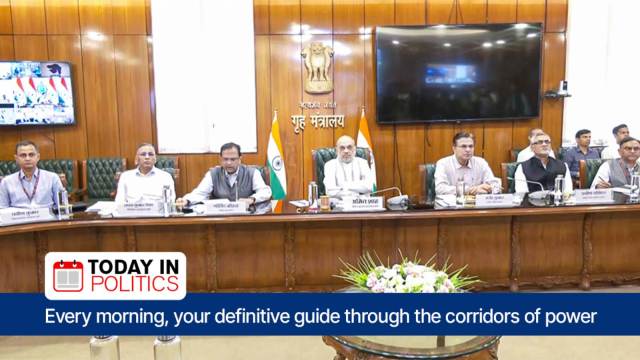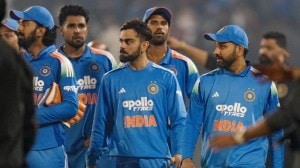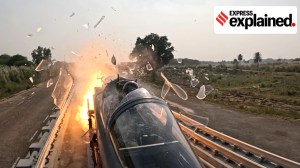Today in Politics: Why the all-party meeting to discuss Operation Sindoor is important
The Congress Working Committee (CWC), the party’s highest decision-making body, declared “full support” to the armed forces saying it was “time to be united”. Other parties too have spoken similarly
 Union Home Minister Amit Shah chairs a meeting with Chief Ministers, Director Generals of Police and Chief Secretaries of border states, in New Delhi on Wednesday. Union Home Secretary Govind Mohan and Secretary (Border Management) in the Ministry of Home Affairs, Rajendra Kumar and others also seen. (ANI Photo)
Union Home Minister Amit Shah chairs a meeting with Chief Ministers, Director Generals of Police and Chief Secretaries of border states, in New Delhi on Wednesday. Union Home Secretary Govind Mohan and Secretary (Border Management) in the Ministry of Home Affairs, Rajendra Kumar and others also seen. (ANI Photo)Operation Sindoor Political Meeting: Key political leaders across parties and ideologies will be present at the all-party meeting Thursday to discuss Operation Sindoor.
On Wednesday, the Congress Working Committee (CWC), the party’s highest decision-making body, declared “full support” to the armed forces saying it was “time to be united”. The Congress has also decided to halt all planned party programmes.
Jairam Ramesh, the Congress’s secretary in-charge of communications, and party president Mallikarjun Kharge urged Prime Minister Narendra Modi to attend the all-party meeting.
All Opposition parties fully backed the operation.
“We discussed… full support to our forces, best wishes to them, much love to them, complete support from the Congress party,” Congress leader and Leader of Opposition Rahul Gandhi said, making a delicate distinction between the government and the armed forces in his praise – as did other parties in the course of the day.
NCP (SP) chief Sharad Pawar said he had spoken to Modi and Defence Minister Rajnath Singh and assured them his party’s full support.
“We are extremely proud of our Indian armed forces who have stuck terror camps in Pakistan and PoK… Since the day of the Pahalgam Terror Attack, the Congress has categorically stood with the armed forces and the Government to take any decisive action against cross border terror… Our leaders have shown… in the past that national interest is supreme for us,” Congress president Mallikarjun Kharge said in an early morning social media post. “Proud of our armed forces. Jai Hind,” said Rahul soon after.
“Tamil Nadu stands with the Indian Army against terrorism. With our Army, for our nation,” Chief Minister and DMK chief M K Stalin, who has had a series of run-ins with the Modi government, posted.
“The courage of the Indian Army is the faith of every citizen. We are all together – united against terrorism. Hail India,” AAP leader Kejriwal said.
“The Indian Army has every time protected the wombs of mothers, the wrists of sisters, and the vermillion on their foreheads… If people who foster terrorism attack our unity, integrity and sovereignty then we know how to unite… In this fight… 140 crore Indians are with the Indian Army and the Government,” the RJD’s Tejashwi Yadav, facing a tough battle against the BJP in the coming Bihar polls, said.
Similar laudatory statements came from the Samajwadi Party’s Akhilesh Yadav, one of the foremost anti-BJP voices, and other Opposition leaders. “The CPI believes that India had little choice but to respond firmly,” general secretary D Raja said. In unusual praise of the Modi government from a CPI leader, he added: “The targeted nature of the strikes – avoiding Pakistani military assets and focusing solely on terrorist infrastructure – demonstrates a calibrated and non-escalatory approach, prioritizing accountability without inviting full-scale conflict.”
At the same time, he advocated “pursuing diplomatic avenues to prevent further escalation and preserve peace”.
IN CONTEXT: While the Opposition had earlier too declared unconditional support to the government in whatever actions it took against the perpetrators of the April 22 Pahalgam terror attack and their handlers, the Congress had flagged the issue of “security and intelligence lapses” in subsequent days. It had sought fixing of accountability in a time-bound manner, and said it was time “for demonstrating our collective will as a nation to teach Pakistan a lesson and curb terrorism decisively”.
On Wednesday, the mood was clearly different.
Back in 2019, a day after the Balakot airstrikes in February, and in the wake of the Pulwama bombing, 21 Opposition parties put out a joint statement saying they were “anguished” over the “blatant politicisation” of the sacrifices of armed forces (40 security personnel were killed in the terror attack) by the ruling BJP.
Some days later, senior Congress leader Digvijaya Singh drew backlash for himself and the party for demanding that the Modi government give “evidence” of the damage it claimed to have caused to Pakistan with its air strikes in Balakot.
The BJP had flagged such “anti-national” remarks during its Lok Sabha poll campaign, which is believed to have hurt the Congress.
A day after it carried out the surgical strikes on the night of September 28-29, 2016, in response to Uri, the Modi government had briefed an all-party meeting. Then External Affairs Minister Sushma Swaraj had personally driven down to meet Congress president Sonia Gandhi, who had been staying away from public events after hospitalisation.
While the government gave few operational details, besides saying the Army operations took place at two points across Kupwara and Poonch, Sonia said in a statement after the meeting that the party “stands with the government”, and called the strikes a “strong message that conveys our country’s resolve to prevent further infiltration and attacks on our security forces and our people”.
Rahul tweeted: “All of us stand firmly united against terrorism and those who support and sponsor it. The Congress Party and I salute the Indian Army and our jawans.”
However, days later, Rahul accused PM Modi of “playing politics over the blood of jawans”. After he came under attack, he tweeted: “I fully support surgical strikes and I have said so unequivocally. But I will not support using the Indian Army in political posters and propaganda all across the country.”
Rahul’s stand drew fire from not just the BJP, but also the Aam Aadmi Party. Arvind Kejriwal said Rahul should not have used words like “dalali”, and the times called for everyone to stand united. “I strongly condemn what Rahul Gandhi said about our jawans,” the AAP convenor said.
At a press conference, then BJP president Amit Shah said: “Some parties tried to question the surgical strikes, some even raised doubts. I condemn all those who have insulted our Indian Armed Forces.”
- 01
- 02
- 03
- 04
- 05































